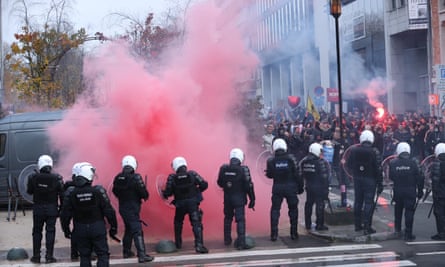The Dutch prime minister, Mark Rutte, has lambasted as “idiots” people who turned to “pure violence” during three consecutive nights of anti-lockdown protests across the Netherlands.
Rutte told Dutch media that their actions had “nothing to do with demonstrating” but were “a pure explosion of violence directed against our police, against our firefighters, against ambulance drivers”.
At least 130 people have been arrested, four wounded and several police officers injured since the violence began in the port city of Rotterdam on Friday.
Rutte, who leads a caretaker government, said he would always fight for the right to demonstrate, as part of Dutch democracy and the rule of law, “but what I will never accept is that idiots use sheer violence against the people who work for you and me every day … to keep this country safe under the guise of: ‘We are dissatisfied.’”
The Netherlands tightened coronavirus restrictions last week after a surge in cases, as rising infections across Europe trigger tougher measures from governments.
Rutte’s government is facing calls from opposition politicians to go further, either by banning non-vaccinated people from bars and restaurants, or closing all non-essential shops and other venues.
Last Friday in Rotterdam hundreds of rioters torched cars and threw rocks at police in what the city’s mayor called an “orgy of violence”. On Saturday night protesters lit fires in The Hague and other cities, including at a primary school in Roosendaal in the southern Netherlands. On Sunday demonstrators were out in force in the northern cities of Groningen and Leeuwarden, Enschede in the east and Tilburg in the south, where they threw fireworks and vandalised property.
In Belgium politicians have condemned violence in Brussels, after a peaceful demonstration against coronavirus restrictions turned violent.
Belgium’s home affairs minister, Annelies Verlinden, said: “A mature democracy respects the opinion of a minority but does not accept that a few abuse their protest vote by force. Vaccinated or not: it is important that we continue to follow the measures. Only together can we win the fight against the virus.”
Police estimated that 35,000 demonstrators gathered in the Belgian capital to march against the Covid Safe Pass, the app demonstrating vaccine and recovery status, which is essential to enter bars and restaurants. But many wanted to voice discontent more broadly with Covid restrictions, which were tightened last week as infections rose.

Local media reported a varied mix of people at the demonstration, including the far-right, people espousing anti-vaccine conspiracy theories and antisemitism, as well as seemingly apolitical people opposed to vaccination, including entire families.
The daily Het Nieuwsblad reported that healthcare workers stood shoulder to shoulder with people who had pinned Jewish stars on their clothes in protest at what they called a Nazi regime. It also reported attendance by the anti-vaccination, anti-mask, Dutch-speaking “Teachers for Freedom” group, as well as MPs for the Flemish far-right party, the Vlaams Belang.
One nursery nurse, Tina Cleybergh, told the paper she had come to the protest because the Covid pass had created division in society, “in which unvaccinated people feel labeled as criminals”.
Some protesters expressed concern their intended peaceful gathering had been infiltrated by troublemakers.
A police spokesperson told De Standaard that many of the agitators were “hooligan-like types” already known to law enforcement. The spokesperson said the crowd was diverse: “What they have in common is mistrust in the system and politics, especially in the area of coronavirus.”
Police used water cannon and teargas to disperse violent protesters, who massed close to EU headquarters, where they were throwing firecrackers, smashing cars and setting bins on fire. Officers made at least 45 arrests, including two on suspicion of armed rebellion. Three police officers and one protester were injured and taken to hospital.
The violence has reignited the debate on compulsory vaccination in Belgium, an idea that divides the seven-party ruling coalition.
On Monday, Pierre-Yves Dermagne, the Socialist deputy prime minister, who is also economy minister, said it was necessary to reopen the discussion. “We must have this debate because we know that we are going to live with this virus for months and even years. We cannot limit ourselves to short-term measures.”
Last week Belgium’s liberal prime minister, Alexander De Croo, dismissed mandatory Covid jabs as a “false good idea”, arguing it would be difficult in practice and more effective to persuade people.
The government is already facing backlash over mandatory Covid jabs for healthcare workers. On Monday about 50 people protested against the recently agreed policy outside a hospital in the eastern town of Libramont.
From 1 January all healthcare workers in Belgium are obliged to be vaccinated against coronavirus, or face redundancy if they refuse.
